RCS messaging for businesses
Deliver richer and more engaging customer messages with RCS
From image carousels to instant action buttons, RCS empowers your brand to create interactive experiences that build loyalty, boost engagement, and drive conversions.
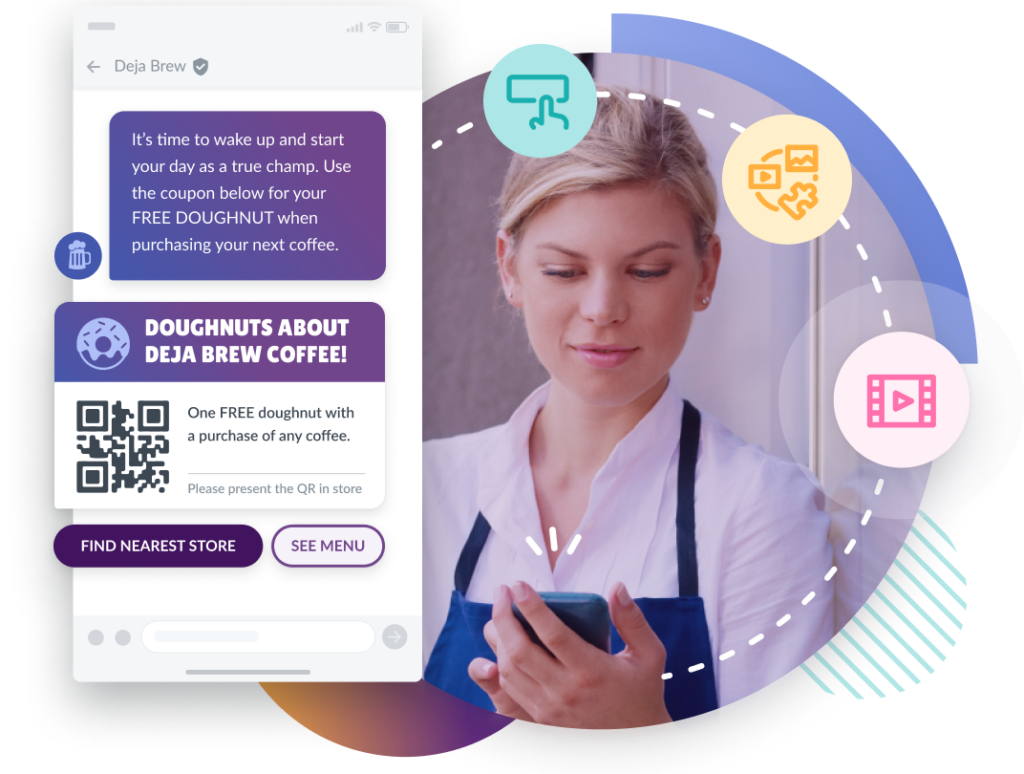






Upgrade your messaging with RCS
RCS gives you more than just text. From branding and rich media to instant reply buttons and verified sender details, every message is designed to create a more engaging and trusted customer experience.
Branded and verified
Build trust with a verified sender profile, custom logo, and business name that customers instantly recognise.
Interactive by design
Add buttons, carousels, quick replies, and calls to action that make messages actionable and intuitive.
Rich media ready
Send images, videos, maps or QR codes directly inside the message. No extra links are required.
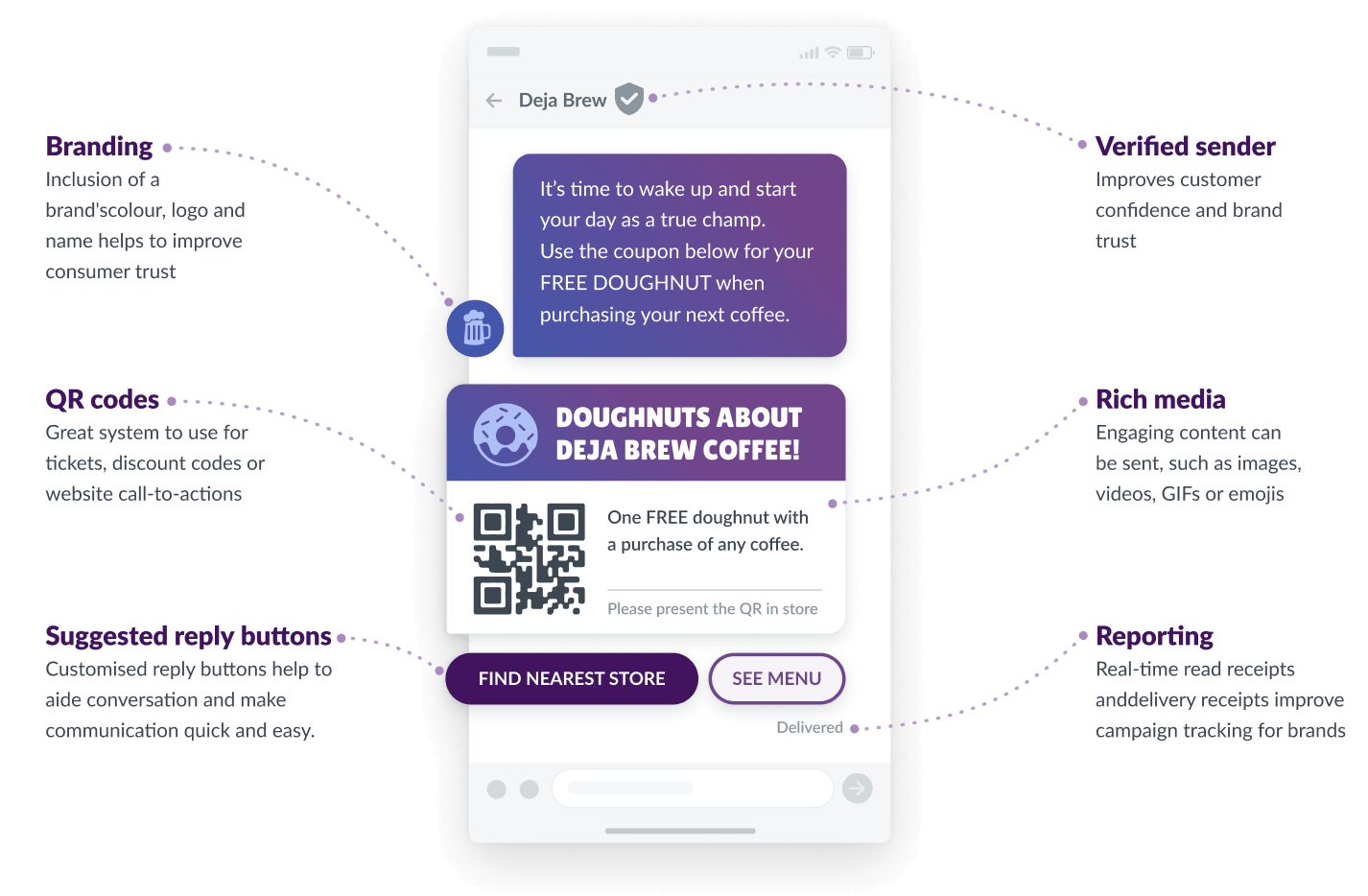
Start your free trial
See what rich business messaging can do. Get 25 free messages over 7 days to try RCS for yourself, no credit card required.
“Esendex products greatly enhance the way we speak with our customers from sales follow-up and engineer appointment confirmations, all the way through to general Q&As.”
ARRON ALDERSON | SOLUTIONS AND PROCESS MANAGER | VAILLANT

How are businesses using RCS?
Retail
RCS helps retailers create rich, branded messaging experiences directly within the customer’s native messaging app.
With support for images, buttons, payments and real-time interaction, RCS turns simple messages into fully interactive shopping journeys.
Example applications include:
- Send digital receipts
- Customer service chat interactions
- Arrange/rearrange delivery times and delivery updates
- Upsell or cross-sell products with carousels
- Receive payments
- Deliver marketing messaging
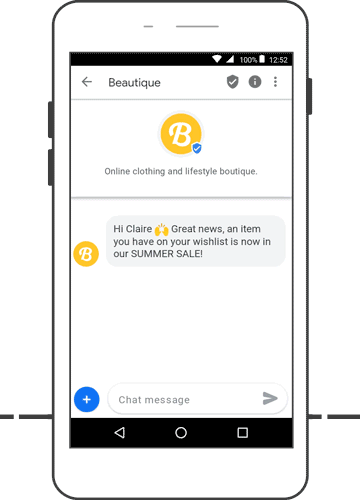
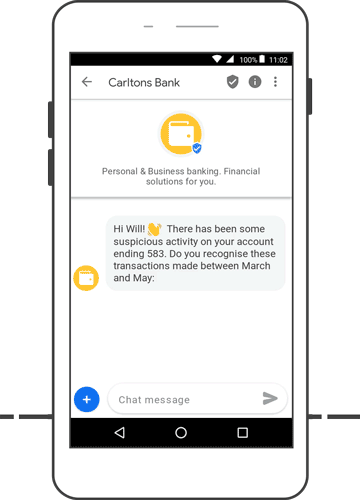
Finance
Gain “verified sender” status to help to eradicate spam and reassure customers that interactions are not from fraudulent sources.
Set-up branded, automated interactions with customers, using tools like buttons and linked payment facilities – all of which help to promote self-service.
Example applications include:
- Updating insurance claims (e.g. uploading photos and other details)
- Making payments via linked facilities
- Missed payment reminders with linked payment processing
- Renewing policies
- Applying for loans/credit
- Fraudulent activity notification
- Arranging in-branch appointments
- Customer identity verification
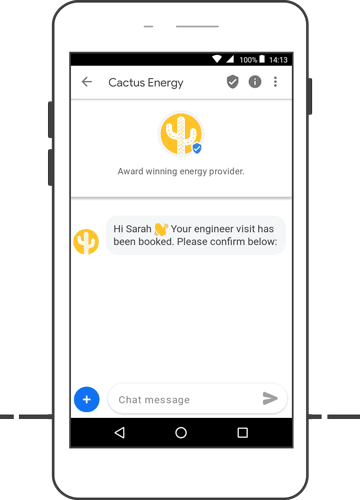
Utilities
Manual processes undertaken by utility providers can be easily automated in a rich and intelligent way with RCS.
This means that providers can expect to reduce the strain on their in-house resources, and also provide more convenient tools for customers to access services.
Example applications include:
- Collect meter readings
- Provide tariff selection facilities
- Chat style customer service
- Bill payments
- Frequently asked questions.
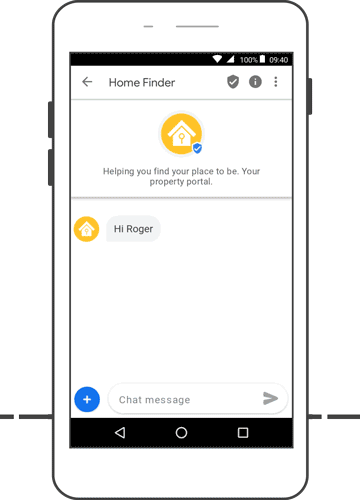
Property & Estate agents
With RCS, agencies can add far richer content to their customer interactions. The net reults is that agents spend less time on the phone speaking with potential customers, which in turn frees them up to focus on other value add tasks.
Example applications include:
- Rich property alerts including dynamic fields based on search criteria (including images, video, text, and maps)
- Carousels with available properties making selections easier
- Live chat with an agent without having to make a call
- Booking and rearranging house viewings automatically
- Document exchanges.
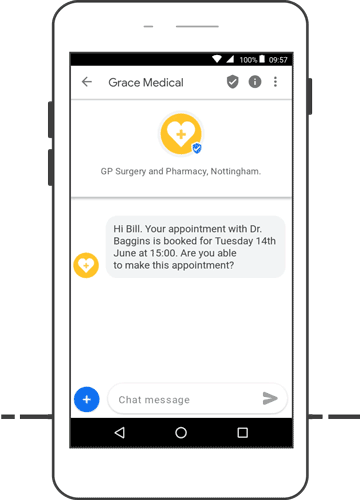
Healthcare
RCS supports enhanced engagement with patients, allowing them to perform many tasks independently, which would have previously required interaction with a healthcare representative.
Example applications include:
- Booking and rearranging appointments automatically
- Add appointments to calendar
- Sending smart appointment reminders (i.e include images of healthcare professionals and practices)
- Innoculation reminders (i.e. link to existing appointment management systems)
- Send prescriptions
- Supply test results.
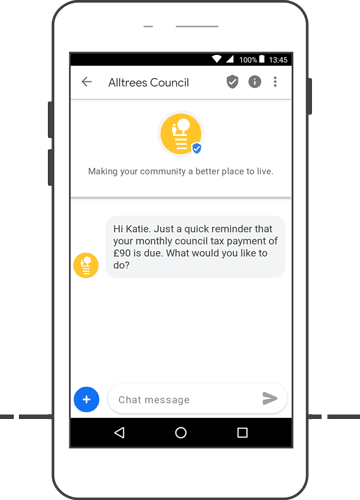
Local Government
Local Governments have to carefully plan how to effectively engage with each of their audiences, to ensure all messages reach their destination.
RCS can help with this by increasing engagment levels, while at the same time reducing costs.
Example applications include:
- Collect council tax or arrange repayment plans
- General notifications
- Maintenance engineer appointments booking and rearranging
- Service closure notification
Reach customers on their preferred channel
The Esendex platform supports SMS and RCS, giving you the flexibility to choose the right format for each customer.
SMS is great for fast, universal delivery of time-sensitive updates. It reaches every phone, making it a reliable choice for essential notifications.
RCS adds another layer, allowing you to send branded messages with images, buttons and interactive features that create a more engaging customer experience.
If a customer’s device doesn’t support RCS or they aren’t online, your message will automatically be delivered as a standard SMS.

Let’s start sending, together.
Discover the full power of our mobile messaging platform.
Drive results with RCS
Lower customer service costs
Use automation and two-way messaging to handle routine queries more efficiently. Free up your support team while giving customers faster, more convenient ways to get help.
Track performance in real time
Access delivery and read receipts with built-in reporting tools. Measure what’s working, identify opportunities, and refine your communication strategy as you go.
Improve ROI
Boost engagement, reduce drop-offs and drive more conversions. RCS helps you create richer, more effective customer journeys that deliver measurable returns.
Tap into professional services and support
Our Professional Services team is here to help you get the most out of your messaging. From setup to advanced workflows, we’ll work with you to build solutions that support your goals.
Esendex, your reliable business messaging partner

20+ years experience
We’ve been helping businesses send text messages to customers for over two decades. Our team brings in-depth knowledge and technical expertise to every solution we deliver..
46,000+ customers
Organisations of all types and sizes trust Esendex to power their communications. From fast-moving retailers to highly regulated sectors, we support a wide range of messaging needs.
5B+ messages per year
Our platform is built for high performance at scale. Every year, we deliver billions of SMS messages with the speed, security and reliability our customers rely on.
Security and compliance
We’re ISO 27001 certified and fully GDPR compliant. From data protection to message delivery, security is at the core of everything we do.
Global reach
Send messages worldwide with confidence. Our direct carrier connections and in-country knowledge ensure reliable delivery across borders.
Flexible integration
Use our intuitive web platform or connect via API. Whether you’re sending one-off messages or building complex automations, we give you the flexibility to work your way.
Let’s start sending, together.
Discover the full power of our mobile messaging platform.
